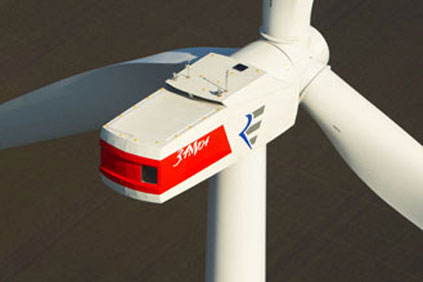The rumours were strengthened by last month's resignation of Repower chief financial officer Derrick Noe. According to a company statement his departure was based on "amicable mutual agreement due to different views on the company's future business strategy".
Repower has arguably had its wings clipped recently by Suzlon's current policy of incurring only "must have" capital expenditure (capex). Repower is not allowed to incur any capex other than for offshore/ multimegawatt turbine manufacturing.
Protected
However, Repower may be partially insulated from Suzlon's woes by the fact that management control, and profit-and-loss transfer agreements have not been signed with its Dutch parent, and a 100% subsidiary of Suzlon, AE-Rotor Holding. This was confirmed by a Repower spokeswoman. Under Germany's Stock Corporation Act, had these been signed, Repower would be fully under AE-Rotor/ Suzlon management.
Repower could also be protected on another front. In the most recent HSBC Global Research analysis of Suzlon business, published last month, analyst Charanjit Singh said: "It is believed there are covenants built into bank loans to Repower that limit free transfer of cash from it to Suzlon."
Denying Suzlon access to Repower's bank account may have helped the latter clinch a new overdraft facility with German banks BayernLb, Commerzbank and Deutsche Bank. The syndicated revolving multicurrency letter of guarantee for €725 million and a credit facility of €25 million, both running for two-and-a-half years, were "based on a stand-alone view of Repower".
But the HSBC report does suggest it may be possible for Suzlon to take not only dividends from Repower but also upfront payments — for instance, in connection with manufacture of Repower 2MW turbines in a Suzlon factory in India, since this creates the required business relationship between the two firms. HSBC suggests this could amount to roughly INR 1.1 billion (€14.6 million) in Repower dividends and INR 5.0 billion in advances.
Repower performed well for the first nine months of the business year ending 31 March, with a profit of about €50 million, compared with €55.6 million for the whole of business year 2010/2011.
Suzlon, though, has huge debt pressures. The HSBC analysis of Suzlon cash flow implies a shortfall of almost half of the first tranche (INR 15.5 billion) of a foreign currency convertible bond (FCCB) payment due in June.
Suzlon may try to solve its problems, at least in part, by converting around 50% of the FCCBs, which total around INR 28.5 billion, to equity in the form of 711 million new shares, says Singh. This would renew pressure on Suzlon's share price but this may be more attractive to Suzlon than selling all or part of Repower; a full divestment would effectively hollow out Suzlon's own business. As Suzlon CEO Tulsi Tanti is no doubt aware, Repower's order book as of 10 February stood at €3.5 billion — 63% of Suzlon's total order book of €5.6 billion.

.png)



.png)









